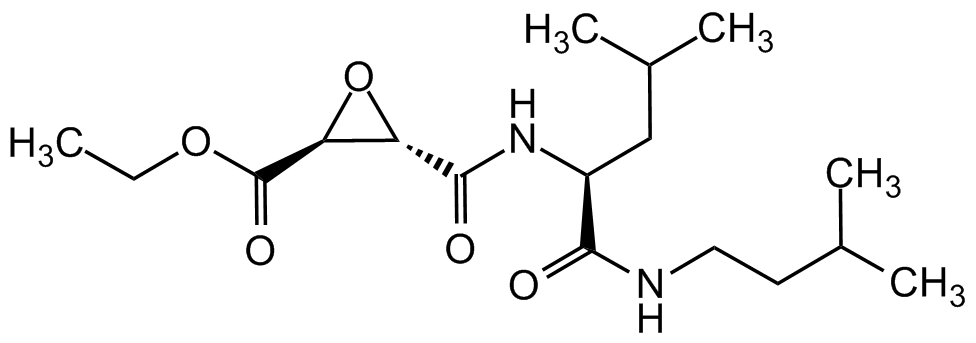
Chemical Structure
Aloxistatin [E-64d] [88321-09-9]
AG-CR1-3737
CAS Number88321-09-9
Product group Chemicals
Estimated Purity>95%
Molecular Weight342.4
Overview
- SupplierAdipoGen Life Sciences
- Product NameAloxistatin [E-64d] [88321-09-9]
- Delivery Days Customer10
- CAS Number88321-09-9
- CertificationResearch Use Only
- Estimated Purity>95%
- Molecular FormulaC17H30N2O5
- Molecular Weight342.4
- Scientific DescriptionAloxistatin [E-64d] is a cell permeable irreversible inhibitor of lysosomal and cytosolic cysteine proteases cathepsin B an L, calpain 1/2, papain and has diverse biological activities. It is an ethyl ester form of E-64c that inhibits calpain and the cysteine proteases cathepsins F, K, B, H, and L. Aloxistatin has anticancer properties by inducing cell cycle arret at the G2/M phase in A431 human epidermoid carcinoma cells and as a lysosomal inhibitor in human acute promyelocytic leukemia NB4 cells and Huh-7 cells. It inhibits degradation of autophagic cargo inside autolysosomes. It also shows neuroprotective and anti-malarial properties. Since cysteine protease cathepsin L is required for SARS-CoV-2 viral entry, aloxistatin treatment reduces cellular entry of SARS-CoV-2 pseudovirions and COVID-19. It inhibits severe acute respiratory syndrome coronavirus (SARS-CoV) and SARS-CoV-2 surface glycoprotein incorporation into pseudotyped vesicular stomatitis virus (VSV) particles in Vero cells. Is has been applied in vitro in combination with the TMPRSS2 inhibitor camostat mesylate (Prod. No. AG-CR1-3716). - Chemical. CAS: 88321-09-9. Formula: C17H30N2O5. MW: 342.4. Aloxistatin [E-64d] is a cell permeable irreversible inhibitor of lysosomal and cytosolic cysteine proteases cathepsin B an L, calpain 1/2, papain and has diverse biological activities. It is an ethyl ester form of E-64c that inhibits calpain and the cysteine proteases cathepsins F, K, B, H, and L. Aloxistatin has anticancer properties by inducing cell cycle arret at the G2/M phase in A431 human epidermoid carcinoma cells and as a lysosomal inhibitor in human acute promyelocytic leukemia NB4 cells and Huh-7 cells. It inhibits degradation of autophagic cargo inside autolysosomes. It also shows neuroprotective and anti-malarial properties. Since cysteine protease cathepsin L is required for SARS-CoV-2 viral entry, aloxistatin treatment reduces cellular entry of SARS-CoV-2 pseudovirions and COVID-19. It inhibits severe acute respiratory syndrome coronavirus (SARS-CoV) and SARS-CoV-2 surface glycoprotein incorporation into pseudotyped vesicular stomatitis virus (VSV) particles in Vero cells. Is has been applied in vitro in combination with the TMPRSS2 inhibitor camostat mesylate (Prod. No. AG-CR1-3716).
- SMILESO=C(OCC)[C@H]1O[C@@H]1C(N[C@H](C(NCCC(C)C)=O)CC(C)C)=O
- Storage Instruction-20°C,2°C to 8°C
- UNSPSC12352200


![Aloxistatin [88321-09-9] [88321-09-9]](https://www.targetmol.com/group3/M00/35/65/CgoaEWayHoGEKNS0AAAAALeZWAo041.png)